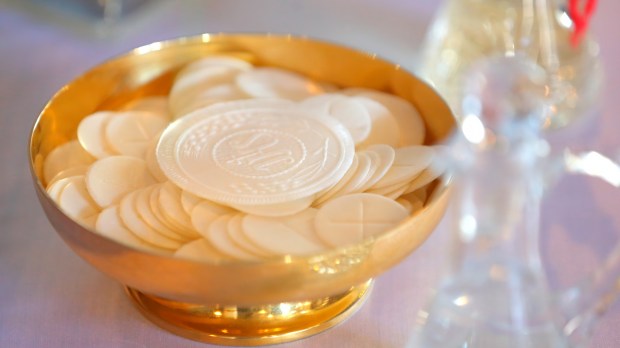Of the many ways in which the COVID-19 pandemic has impacted the Catholic Church, one has gone largely unnoticed.
As the pandemic picked up steam in March of 2020, millions of Catholics began to “attend” Mass via internet or television. Instead of receiving Communion in person, they might make what is called a “spiritual communion” instead — a prayer asking Jesus to come into their souls.
Thus, churches were largely empty for months, leading to a drastic drop in the use of Communion wafers. Parishes were left with bags of unused hosts, so there was no need to receive further shipments for the time being.
In many cases, these hosts, also known as altar breads, are baked and sold by religious communities. Sales of such wafers provide financial support for the communities, which are mostly sisters or nuns.
With orders canceled, these communities soon began to feel the pinch.
“Before the pandemic, we had about 200 customers,” said Sister Anna Tran, O.C.D., who oversees altar bread production at the Carmel of St. Teresa in Alhambra, California, a community of cloistered discalced Carmelite nuns. “We shipped approximately 250,000 hosts to parishes, hospitals, schools, and religious communities per week. Once the pandemic hit, by April 2020, all of the orders from our customers were cancelled. The customers who did order were very minimal (about 10%), so probably about 90% of our customers either cut down or cancelled their order completely.”
Mother Brenda Marie Schroeder, O.C.D., prioress of the Carmel of St. Teresa, said that after a year “we had to throw away all our supply of small altar breads. It was starting to get buggy.” She said that large hosts were still in demand because priests were still celebrating Mass, albeit privately. But not the small ones.
The Carmel wrote recently to customers, who are throughout the Archdiocese of Los Angeles, as well as parts of Nevada and Arizona, expressing the hope that they would resume their orders when public Masses resume.
Technical help
In the meantime, a local supporter of the nuns, Jennifer Nolan, offered to help, because she realized what an impact the loss of business would have on the Carmel.
“I thought I could set up a monthly donation base,” said Nolan, founder of Catholic Polytechnic University. “Hillsdale College has thousands of people who give $10 a month. That’s what these nuns need — an army of people.”
So Nolan set up a monthly donation option on the nuns’ website. The change soon made a difference. “Just in one week we got 27 donors for them,” Nolan said. “It’s so hard not to know: ‘Are we going to have enough money for food next month?’ If they have 100 donors giving $20 a month, they’ll have an amount they know they can depend on.”
Another contemplative community severely affected was Valley of Our Lady Cistercian Monastery in Prairie du Sac, Wisconsin. “Our sale of people’s breads — from which we earn the majority of our income — dropped nearly 60% from April 2020 to April 2021, while our sale of priest’s breads increased 3%,” a nun there told Aleteia, asking to not be named.
But in Valley of Our Lady’s case, the disruption also had a benefit. “We gained 57 new customers during the pandemic — many of them specifically for our priest hosts,” the nun said. “Many priests prefer our breads, whose quality and design are unique in the market. Prior to the pandemic we were unable to accept new customers.”
The biggest change brought on by the pandemic, however, seems to have taken place with the Benedictine Sisters of Perpetual Adoration in Clyde, Missouri. The sisters made the difficult decision to largely cease altar bread production, which they had been engaged in since 1910.
“All these years we’ve been the largest religious producer of altar breads,” said Sister Ruth Elaine Starman, O.S.B. “We sold wholesale to other religious communities who over time just got too small to really keep up their own production. We have provided to Carmelites, Poor Clares, and some other Benedictine monasteries over the years.”
Because of COVID, “everything just tanked,” Sister Ruth said. And it “tanked” right before Easter. “Lent and Easter are really the biggest selling season for altar breads,” she noted.
Community impact
Sadly, the Benedictines’ decision meant that they had to let go the 13 lay people who worked in altar bread production along with six or seven nuns. The decision had to be permanent because the people had to find other jobs, and since the abbey is in a rural area, it would be difficult to find staff to hire, once operations were up to speed again.
Sister Ruth said that in the last normal year before COVID, the top seller was a 1⅜” wheat host. The abbey sold 19,823,000 of them in a year.
“In a normal year, from January to April, we might sell 7,253,500 hosts,” she said. “This previous four months, in 2021, in the midst of COVID, with things just opening up, we sold 2,238,000. So we’re at about 30% of what we’d sell pre-COVID.”
The nuns will now become a distributor for Cavanagh Altar Bread, a secular producer based in Rhode Island. The sisters will continue producing their own low-gluten hosts, however. They were the first to produce such hosts since the Vatican approved them for Catholics who suffer from celiac sprue.
In spite of the disruption, Sister Ruth said the abbey is in “pretty good shape,” financially, since benefactors have stepped up in the time of crisis. “It’s been beautiful to see how people still want to support us,” she said.
Sister Ruth and others said that, more than their own situation, they are more concerned about lay Catholics and their sacramental life at this time. “I’m hoping that more and more people will decide to go back to church and partake of the sacraments,” Sister Ruth said. “That’s been the biggest tragedy — not that our sales were poor, but that people weren’t able to participate in the sacraments at all. It’s just not the same, watching on TV.”
“We were not worried about our economic condition,” the Cistercian nun at Our Lady of the Valley said. “The less we possess the more aware and grateful we are for what we do have, and the more alive we are to the activity of Divine Providence. … We were far more concerned about the adverse spiritual and moral effects the pandemic and consequent church closures would have on the supernatural life of the laity than we were about our domestic economy. We’d rather lack material necessities ourselves than see a single soul lose grace, or weaken in faith, hope and charity.”
Added Mother Brenda Maria, of the Carmel in Alhambra, the pandemic and the shutdown “made us really united with the people. We feel more at one with them, because of everything we’ve gone through together.”



